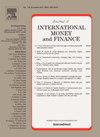INTERNATIONAL FINANCIAL INTEGRATION, ECONOMIC GROWTH AND THRESHOLD EFFECTS: SOME PANEL EVIDENCE FOR EUROPE
IF 3.3
2区 经济学
Q2 BUSINESS, FINANCE
引用次数: 0
Abstract
This paper applies the Seo and Shin (2016) method for estimating dynamic panels with endogenous threshold effects to obtain new, robust evidence on nonlinearities in the relationship between international financial integration (IFI) and economic growth. This approach is based on a first-differenced GMM estimator which allows both the threshold variable and the regressors to be endogenous. More specifically, the present study analyses yearly data for 40 European countries from 1996 to 2021, this European focus yielding novel insights into a region with a diverse economic landscape. The IFI–growth nexus is examined using various IFI measures and thresholds reflecting country-specific characteristics, and then the analysis is extended by comparing the impact of the 2007–2009 global financial crisis (GFC) and of the Covid-19 pandemic respectively on the relationship of interest. The results provide clear evidence of nonlinearities and suggest that the effects of financial integration on economic growth vary depending on factors such as the level of financial development, trade openness, institutional quality, political and economic uncertainty, initial income, and financial openness. Further, the 2007–2009 GFC appears to have had a more significant impact than the Covid-19 pandemic.
国际金融一体化、经济增长和门槛效应:一些针对欧洲的面板证据
本文采用Seo和Shin(2016)的方法来估计具有内生阈值效应的动态面板,以获得关于国际金融一体化(IFI)与经济增长之间关系非线性的新的有力证据。该方法基于一阶差分GMM估计器,该估计器允许阈值变量和回归量都是内生的。更具体地说,本研究分析了1996年至2021年40个欧洲国家的年度数据,这种以欧洲为重点的研究,对这个经济格局多样化的地区产生了新的见解。利用反映各国具体特征的各种国际金融机构指标和阈值来检验国际金融机构与增长之间的联系,然后通过比较2007-2009年全球金融危机和2019冠状病毒病大流行对利益关系的影响来扩展分析。研究结果表明,金融一体化对经济增长的影响取决于金融发展水平、贸易开放程度、制度质量、政治和经济不确定性、初始收入和金融开放程度等因素。此外,2007-2009年全球金融危机的影响似乎比2019冠状病毒病大流行更为严重。
本文章由计算机程序翻译,如有差异,请以英文原文为准。
求助全文
约1分钟内获得全文
求助全文
来源期刊

Journal of International Money and Finance
BUSINESS, FINANCE-
CiteScore
4.20
自引率
4.00%
发文量
141
期刊介绍:
Since its launch in 1982, Journal of International Money and Finance has built up a solid reputation as a high quality scholarly journal devoted to theoretical and empirical research in the fields of international monetary economics, international finance, and the rapidly developing overlap area between the two. Researchers in these areas, and financial market professionals too, pay attention to the articles that the journal publishes. Authors published in the journal are in the forefront of scholarly research on exchange rate behaviour, foreign exchange options, international capital markets, international monetary and fiscal policy, international transmission and related questions.
 求助内容:
求助内容: 应助结果提醒方式:
应助结果提醒方式:


